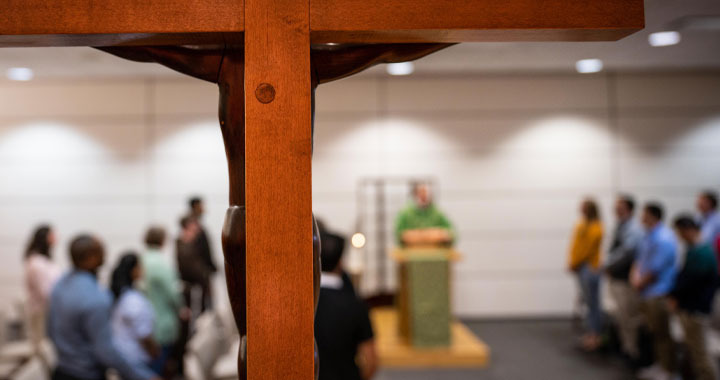Doctor of Ministry Program
Critical Dates and Deadlines
February 1
Priority Scholarship Deadline
May 1
Application deadline for Internationally-based students
July 15
Application deadline for US-based students
DMin
Outcomes
Pre-requisites
Application

Program Requirements
30 semester credits:
- DMin Program Immersion
- August 20-22, 2026
- Core I – Introduction to Practical Theology (3 credits)
- Four courses within concentration area (12 credits total)
- Two courses outside concentration area (6 credits total)
- Core II – Thesis Proposal Seminar (3 credits)
- Thesis-Project (6 semester credits)

The graduate of the Doctor of Ministry degree:
- Integrates an advanced understanding of practical theology as a theological discipline and as a fundamental lens for interpreting the dynamics of ministerial practice;
- Leads others in collaborative ministry that recognizes and honors the plurality of contexts, cultures, and perspectives;
- Cultivates a mature spiritual and ethical sensitivity as the basis of ministerial choices; and
- Competently researches, writes, and teaches on topics related to the theology and practice of ministry.

- Significant ministerial experience after the conclusion of graduate theological study. (usually a minimum of 3-5 years)
- Master of Divinity Degree, usually with a minimum 3.0 GPA.
- English language proficiency for graduate level studies.
OR
- Accredited master’s degree (or its educational equivalent), usually with a minimum 3.0 GPA and in an area related to one’s ministry setting or vocational calling.
- Significant ministerial experience after graduate study (usually a minimum of 3-5 years)
- Ability to thoughtfully interpret scripture and the theological tradition of one’s ministry context.
- Capacity to understand and adapt one’s ministry to relevant cultural contexts.
- Ability to articulate and otherwise express a self-understanding of one’s ministerial identity and vocational calling.
- Readiness to engage in ongoing personal and spiritual formation for one’s ministry.
- Applicants who do not have a Master of Divinity Degree, but have a Master of Arts degree can be admitted following a Master of Divinity equivalency determination conducted during the application review. The equivalency determination looks to see that the applicant has taken a sufficient number of graduate level classes in a number of sub-topics in theology and ministry.
- English language proficiency for graduate level studies.
- DMin application
- Three letters of recommendation
- Three (3) recommendations are required: one from an ecclesiastical superior or a religious supervisor who is in a position to evaluate your ministerial experience; one from a person who can evaluate your academic ability; and one from a peer (a colleague in ministry or a friend).
- Curriculum Vitae
- Outline your education (degree and non-degree programs), ministry, publications, presentations, travel, and any other aspects of your professional life that could be of interest to the admissions committee. Note your specific background in the area of concentration you intend to study.
- Reading List
- Provide a list of the readings in theology and ministry that have been influential to you over the past 2 years. What journals do you read and what other professional resources have you found helpful in your ministry?
- Personal Statement
- Write a 1,000-1,500 word statement of your personal goals in ministry. Include a self-assessment describing the experiences that led you to set these goals, as well as your future potential for meeting them.
- Applicants from faith traditions other than Christian:
- If you belong to a faith tradition other than a Christian denomination, describe why you chose to study on this academic level in this interfaith context. Since many of your colleagues will be reflecting out of a Christian perspective, describe how prepared you are to enter and influence that context.
- Transcripts
- Transcripts of all post-secondary academic credits should be sent to CTU by the respective institutions.
- Electronic transcripts should be sent to admissions@ ctu.edu.
- Mailed transcripts should be sent to:
Admissions Office
5416 S Cornell Avenue
Chicago IL 60615
- Mailed transcripts should be sent to:
- English proficiency
- International students must demonstrate proficiency in English by receiving minimum test results from the TOEFL or IELTS tests or have received a degree from a college or university where the language of instruction was English. An admission counselor can provide specific details.
- Letter of Support
- Members of religious communities and ordained ministers need to provide a letter from their religious superior indicating that they support their attendance at CTU and if the community will be providing any financial support for their tuition.
Concentrations
- The “Educating for Witness” concentration is designed for those who assume leadership in educating believers both in the knowledge and in the practice of their faith. It combines religious education, communications, proclamation, and catechesis with the study of key religious values and practices (e.g., peace-building, the promotion of justice, etc.). This concentration is open to those who have previous experience, broadly speaking, in educational ministries and faith formation ministries.
- Required courses for Educating for Witness Concentration
- Designated concentration methodology course.
- One course addressing the history, theology, and/or praxis of a particular form of “witness” (e.g., reconciliation, peace-making, etc.) or a particular praxis which requires the response of witness from a religious perspective. (e.g., human rights abuse, depletion of natural resources, etc.)
- One course concerned with the communicative, educational or proclamatory nature of witness. (e.g., media, catechesis, preaching).
- The rest of the courses are chosen by the student in consultation with their academic advisor to meet their area of research and interest.
- The concentration in Hispanic theology and ministry is intended to equip experienced ministers, both those of Hispanic descent and those of other racial/ethnic/cultural backgrounds, for ministry and leadership in our churches in light of changing demographics as well as in specifically Hispanic ministries. This concentration will bring together critical reflection on the lived praxis of Hispanic communities with the unique body of theological scholarship that has emerged from Latino@ theologians, especially over the past thirty years. The integral relationship between the lived daily experiences of Latino@ communities and the theological reflections that emerge from within these contexts is articulated as teología y pastoral en conjunto. This relationship recognizes the intrinsic connection between theology and ministry as one of mutual accountability lived in community.
- Required courses for the Hispanic Theology and Ministry Concentration
- DSC5200 – Sources and Methods in Latin@ Theology or another designated course.
- Three courses with explicitly Latin@ themes.
- A reading and speaking knowledge of Spanish is recommended and encouraged but not a pre-requisite or a requirement for the program.
- The EDMin thesis-project in either this or other concentrations may be written in either English or Spanish, provided that the student is able to assemble a thesis board according to the program manual that is capable of reading the work if in Spanish.
- This is a concentration for persons who already have experience in intercultural ministry. Consequently, the five-year minimum ministerial experience prerequisite for entry into the program should have been in a specific intercultural setting. The concentration focuses on areas of ministry where cultural differences raise special challenges to pastoral ministry and mission. Skills development in this concentration focus on tools for analysis of cultures, communication across cultural boundaries, and differing styles of leadership appropriate to living on cultural boundaries. Theory centers on the understanding of cultures, the intersection of culture and theology, cultures and colonization, and the formation of communities within and across cultural and faith boundaries. The concentration is interdisciplinary and ecumenical.
- Required courses for the Intercultural Studies and Ministry Concentration
- CD5001 – Inculturation: Theory and Methods or another designated course.
- One course with a specific cultural/religious theoretical focus.
- Two other courses sponsored Intercultural Studies and Ministry department.
- The concentration in liturgy prepares people to attend to the entire worship event in order to render it more authentic and effective. It combines historical and systematic studies with emerging pastoral methods to enable students to construct worship in the light of liturgical traditions and to assess the effectiveness of worship in particular communities. It is a concentration for persons who already have experience in liturgical ministries, not for those who wish to enter this ministry for the first time. Consequently, the five years of ministerial experience prerequisite for entry into the program should include a significant focus on liturgical ministry.
- Required courses for the Liturgy Concentration
- W5230 – Liturgical Methods
- Three other courses sponsored by the Word and Worship department
- The concentration in spirituality is designed to enhance the intellectual and pastoral skills of those whose ministerial goal is to foster spiritual development through leadership within communities. Participants in this concentration will enter into dialogue with contemporary scholarship in the academic field of spirituality, as well as in other theological disciplines and the human sciences. They will be encouraged to integrate their pastoral expertise as spiritual leaders with intensified theological, historical, and cross-cultural awareness. This concentration is intended for people who already have experience in spiritual ministry, not for those who wish to enter this field for the first time. Consequently, the five years of ministerial experience prerequisite for entry into this program should include significant focus on spiritual ministry.
- Required courses for the Spirituality Concentration
- Foundations for the Study of Spirituality (a designated course).
- One course focusing on historical traditions of spirituality.
- One course focusing on a set of psychological, cultural, and/or pastoral issues relevant to spiritual leadership.
In addition to their course work, spiritual formation is required for all lay students who are pursuing a Master of Arts or Master of Divinity Degree. This formation helps them to integrate their theological coursework into their daily lives. Members of religious communities have formation provided by that community. For more information about formation programs for lay students at CTU, click HERE.

